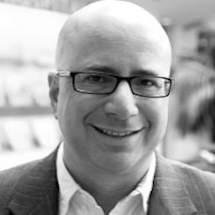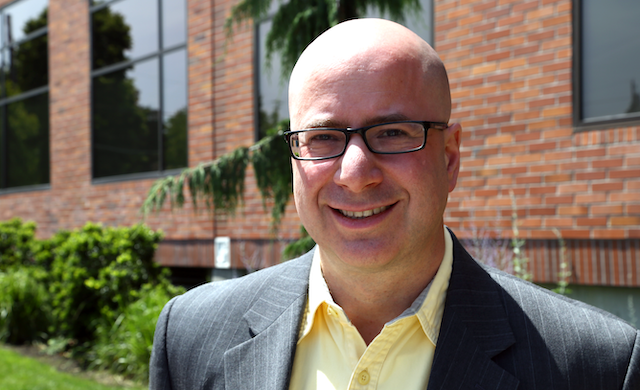
Pet Health Depends on People: That’s Why Dr. Ari Zabell Helps Veterinarians Connect with Pet Owners
11/14/2018 12:00AM | 4793 viewsDr. Zabell’s favorite things in the world as a kid were his pets. He loved going to the zoo and into the woods to look for animals. Today, he’s a veterinarian who also specializes in supporting clients and coaching veterinarians through communicating with pet owners. His work extends beyond veterinary professionals and clients, as he also spends time at elementary schools talking with kids about responsible pet ownership and his work with pets.
When Dr. Zabell was a kid, his parents didn’t bring their family pets to the veterinarian on a regular basis. So, when the family didbring their pets to the doctor, it was a big event.
“I was always amazed by the veterinarians – how they knew how to touch the pets, how to look at them, how to figure things out,” said Dr. Zabell. “I thought it was really impressive.”
When he was seven years old, his mom gave him a Dr. Seuss book called “My Book About Me,” an activity book that encouraged kids to write and draw their own biographies. To answer the question, “What do you want to do when you grow up?” he wrote: Veterinarian.
“I didn’t spell it right, but I remember thinking there’s nothing else I want to do,” said Dr. Zabell. “I loved my dog, I loved animals and I wanted to understand them. I wanted to figure out how to help them when they needed help.”
Toward the end of high school, he got a job working in an animal hospital to gain first-hand experience. During that experience, Dr. Zabell saw there was something new every day – it was never boring and always surprising. He loved it.
What surprised him most at the time was realizing the job is not just about the pets. In fact, a large part of the focus is centered around the people in the room: the pet owners. Veterinarians don’t simply care for the pet, they also help ensure the person who takes care of that pet at home (and is paying the bill) understands what the doctor did for that pet, what it means, how it willhelp, and what’s next.
A Lifelong Passion for Pets and Their People
Dr. Zabell grew up in New York. He got his undergraduate degree in animal science at Rutgers in New Jersey, then completed veterinary school at Cornell University’s College of Veterinary Medicine.
After veterinary school, Dr. Zabell started his career practicing at a small hospital in Reno, Nevada. After about two years there, he was ready for some humidity, so he moved his family to Seattle, Washington and joined Banfield in 1996. He oversaw 12 different Banfield veterinary hospitals in the Seattle area for a few years, then moved to Southern California as part of Banfield’s medical director program. He managed hospitals from a medical quality perspective, coaching doctors on the quality of care that Banfield doctors provide pets and clients. He also worked with the Banfield hospitals that functioned as teaching hospitals for Western University of Health Sciences in Pomona, California.
After eight years in California, he returned to the northwest – this time to Portland, Oregon – taking on different roles at Banfield’s headquarters. This experience enabled him to get different perspectives on how veterinarians can improve the ways they communicate with and help pet owners.
Today, that’s Dr. Zabell’s main focus: helping Banfield doctors strengthen their relationships with clients, by providing coaching and enhancing communication skills. He still provides medical consultations with doctors every day, and practices medicine at Banfield hospitals a few times a year.
“As a young veterinarian, dealing with people was a really intimidating part of the job,” said Dr. Zabell. “But as I matured into the role, it became one of the most exciting parts about the work for me. The pet is why we’re all here. Doctors went to vet school because they love animals. Clients come to us for help because they love their pets and they want to take care of them as best they can.”
That’s why he loves his current role as a coach helping veterinarians learn to develop those people skills.
If you’re considering a career in veterinary medicine, Dr. Zabell offers some helpful guidance:
- Focus on getting good grades. Good grades give you more possibilities.
- Get experience in a veterinary setting as early as possible.Volunteer, get a part-time job, ask to observe – whatever you can do to give yourself some time in a veterinary hospital or clinic setting. This will help you get a jump on the hours you need to accrue in order to get into veterinary school, and it will give you a chance to see if this is really what you want to do. Hospitals and clinics are used to this, and they will help you. Anyone who’s a veterinarian has knocked on the door themselves and said: ‘I want to get into vet school, how do I get started?’
- Explore your options. Small-animal veterinary care is just one of many different ways you can have a career working with animals. Here are some other options:
- Large-animal veterinarians work with cows, pigs, sheep and horses.
- Wildlife veterinarians help solve challenges like investigating how a new housing development will impact wildlife in the area, or figuring out how to deliver a rabies vaccine to a herd of wild animals.
- Veterinary nutritionists help develop pet food with the goal of keeping pets healthier.
- Some veterinarians work for government food safety and public health agencies.
- Zoo veterinarians face a variety of interesting challenges, like how to house a polar bear in a tropical state in a way that’s not only safe for the animal but also sustainable.
There are so many different ways to work with animals, along with research and leadership opportunities like the coaching that Dr. Zabell focuses on today.
If you love animals, there is a wide range of opportunities for you to find your place.






Post your Comment
Please login or sign up to comment
Comments